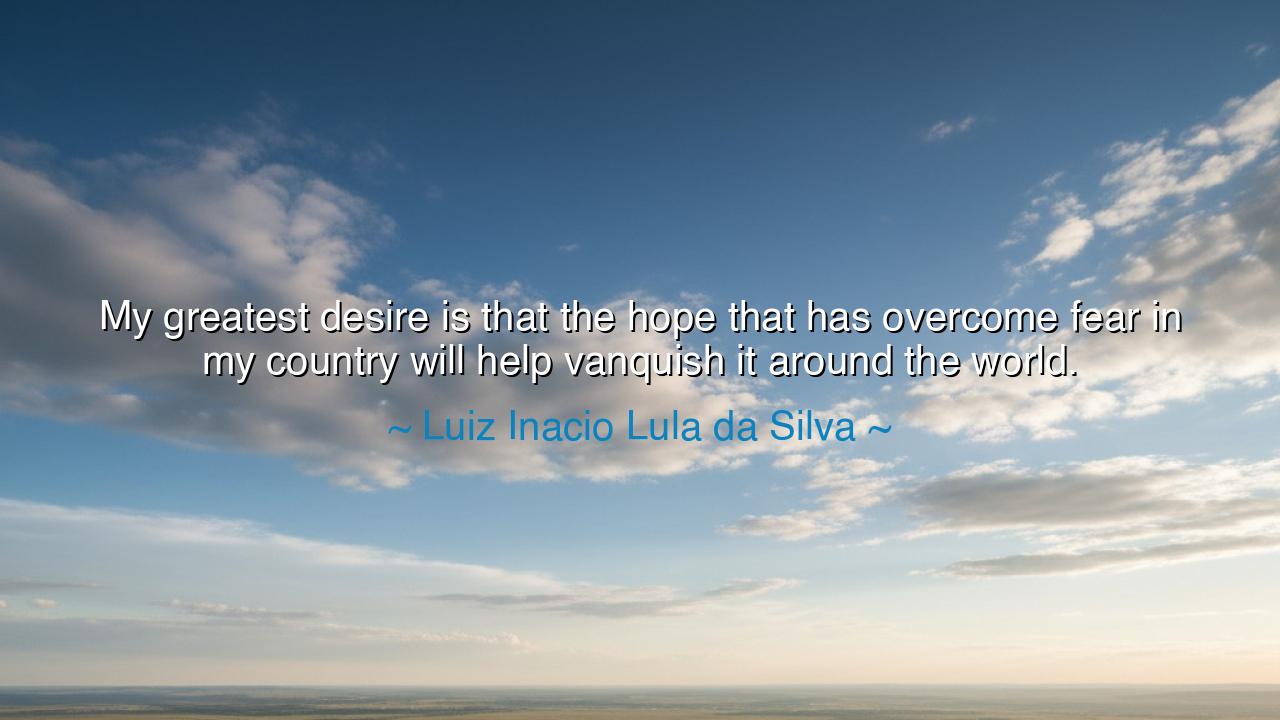
My greatest desire is that the hope that has overcome fear in my
My greatest desire is that the hope that has overcome fear in my country will help vanquish it around the world.






In the moving and triumphant words of Luiz Inácio Lula da Silva, the worker who rose from poverty to lead a nation, there echoes a message for all generations: “My greatest desire is that the hope that has overcome fear in my country will help vanquish it around the world.” This is no ordinary sentiment, but the cry of a man who has witnessed despair and dared to dream beyond it. It is the voice of one who has seen his people bound by oppression, poverty, and doubt — yet who has also seen them rise, carried by the power of hope, stronger than any weapon, deeper than any wound. Lula’s words remind us that hope is not a frail wish, but a living force — one that conquers fear not by denying it, but by standing against it with courage and unity.
The origin of this quote lies in Lula’s journey and the rebirth of his homeland, Brazil, during his presidency. Born into poverty, he began life as a factory worker and union leader, fighting for the rights of the forgotten. He emerged from hardship not with bitterness, but with conviction — the conviction that ordinary people could shape their own destiny. When he became President of Brazil in 2003, his country stood divided and weary. But through reforms, education, and inclusion, he sought to transform fear — the fear of hunger, of inequality, of being unseen — into hope, into belief in a shared future. And when he said these words, he spoke not just of Brazil, but of humanity: that if hope could rise in one place, it could rise everywhere.
To understand the power of these words, one must understand the nature of fear. Fear is the oldest chain known to humankind. It is the whisper that tells the poor to accept their suffering, the oppressed to accept their silence, the weary to stop dreaming. Fear divides nations and poisons hearts; it tells the world that change is impossible. Yet, as Lula saw, hope is its eternal adversary. Hope is not the denial of danger, but the refusal to surrender to it. It is the farmer sowing seeds after drought, the worker striking though threatened, the prisoner believing that freedom will come. Hope begins as a spark — but when shared, it becomes a fire that can light entire nations.
The ancients, too, knew this truth. When the philosopher Plato wrote of the soul’s struggle, he said that courage is born when the higher spirit masters fear. And when the Hebrew prophets spoke to exiled peoples, they told them, “Fear not,” not because the road was easy, but because faith in a better tomorrow gave strength for today. Even in the darkest hours of history, the same pattern unfolds: hope rises where fear once ruled. In World War II, when the bombs fell and tyranny spread across continents, it was the shared hope of freedom that sustained millions — the belief that even in ruin, humanity could rebuild. From that hope was born not only peace, but renewal, proving again that fear, however vast, cannot outlast the human will.
Consider the story of Nelson Mandela, who spent twenty-seven years imprisoned by apartheid. The regime sought to crush his body and extinguish his spirit through isolation and cruelty. Yet Mandela emerged not with vengeance, but with hope — hope for reconciliation, not revenge. And when South Africa held its first free election, that same hope overcame generations of fear. Like Lula’s Brazil, Mandela’s South Africa showed that the power of hope is the power of rebirth, capable of transforming nations once torn apart by injustice into symbols of human resilience.
Lula’s words also carry a warning — that fear, if left unchecked, can return. It disguises itself in many forms: in prejudice, in greed, in despair. Every generation must choose again between the two forces that shape history — the fear that closes hearts, and the hope that opens them. Hope demands action. It asks us to build schools instead of prisons, to feed the hungry instead of blaming them, to listen instead of shouting. It asks us to believe that change is not a dream but a duty. For as Lula himself once said elsewhere, “Hope will always triumph over fear, and love will always triumph over hate.”
So, my child of tomorrow, remember this lesson: hope is not passive. It is the labor of the spirit. When fear whispers that the world is too broken to mend, answer it with the voice of creation — work, speak, love, rebuild. Feed the hungry flame of hope wherever you walk. Do not wait for nations to change; begin with your own heart. When you choose to act with faith instead of fear, you join the ancient line of those who built civilizations, freed the enslaved, and lifted the fallen.
For as Luiz Inácio Lula da Silva teaches, the greatest victory is not of armies or kings, but of hope over fear. It is the triumph of belief over despair, of unity over division. Let that victory begin within you — and may it spread, as he dreamed, from one heart to another, until the light of hope burns bright enough to vanquish fear across all the world.






AAdministratorAdministrator
Welcome, honored guests. Please leave a comment, we will respond soon